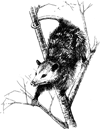Vertebrate Pest Conference: Proceedings

Vertebrate Pest Conference Proceedings: 16th (1994)
Date of this Version
February 1994
Document Type
Article
Abstract
The tropical zones of Latin America are sources of a great faunal richness. A significant number of mammals are associated with damage to the agricultural and livestock industries of Colombia. Some studies have indicated that rodents cause serious economic and social damage in the agricultural, livestock, and stored product sectors of the Colombian economy. Evaluations of this damage have been based on three criteria: 1) the characteristics of the damage; 2) the species of rodent involved; and 3) the loss of production at harvest. Cereals and oil-producing crops are most affected as standing crops; in the livestock area, poultry and pork production are most affected; many agricultural products, especially grains, are attacked by rodents during the post-harvest stage. The level of economic loss caused by rodents can range from about 4% to about 50% depending on the crop, the season, and the species of rodent involved in the damage. Social damages are characterized by the transmission of illnesses such as salmonellosis and leptospirosis via contaminated foods or grains. Six species of rodents of the families Cricetidae and Muridae are most commonly associated with these problems in Colombia.

